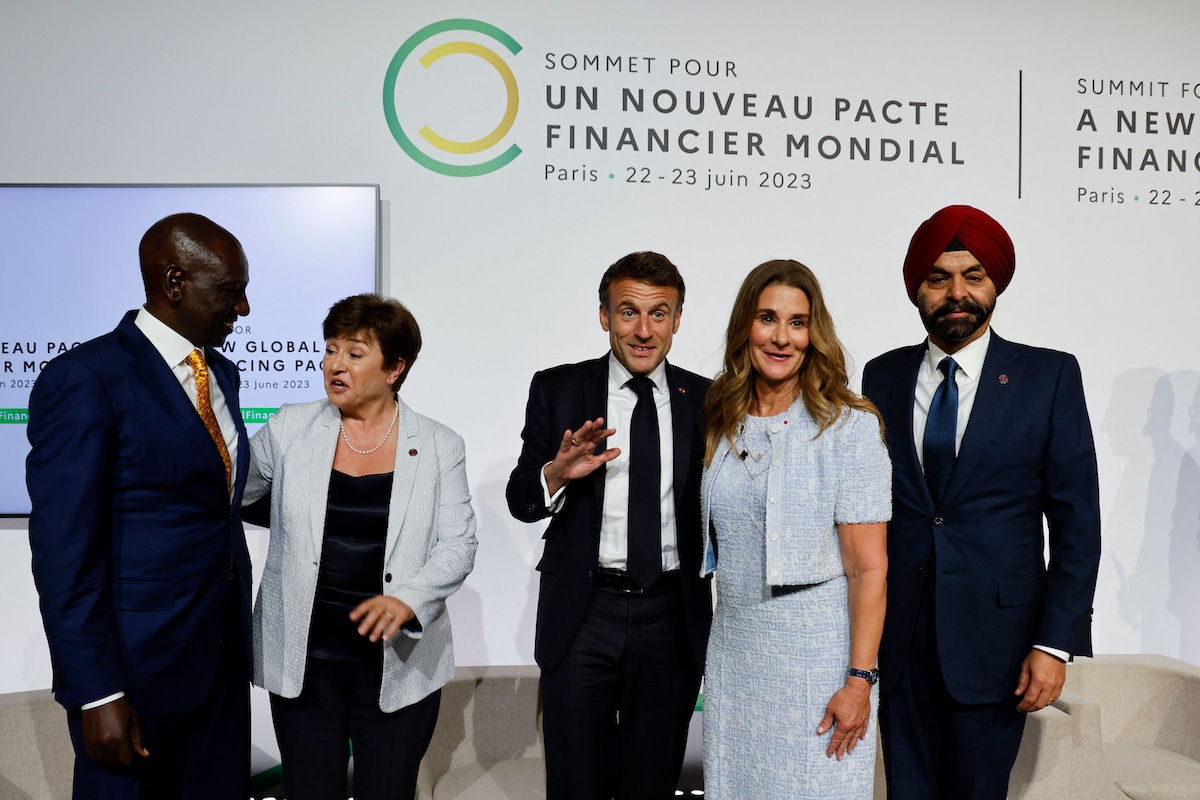World Leaders, Activists Gather in Paris to Seek Financial Response to Climate Crisis, Poverty

 Why you can trust us
Why you can trust us
Founded in 2005 as an Ohio-based environmental newspaper, EcoWatch is a digital platform dedicated to publishing quality, science-based content on environmental issues, causes, and solutions.
The Summit for a New Global Financial Pact, hosted by French President Emmanuel Macron, is being held today and tomorrow in Paris to create a plan to assist low-income nations with their debt and make more funds available for climate financing.
Hundreds of leaders representing about 80 countries, along with climate activists and bankers, will discuss how to tackle current initiatives put before the United Nations (UN), G20, the International Monetary Fund (IMF) and the World Bank, reported Reuters.
Last year, Prime Minister of Barbados Mia Mottley announced a political agenda to reform the structure of global finance and development finance ahead of COP27, called the Bridgetown Initiative. According to the Women’s Environment and Development Organization (WEDO), the initiative considers three intertwined global crises: climate, debt and inflation. It proposes systematic institutional reform and new instruments to finance the UN Sustainable Development Goals and climate resilience.
Much of the summit’s agenda was suggested by a coalition of developing countries represented by the Bridgetown Initiative.
“We are moving to a world — I would call it the Bridgetown system of finance — (that) recognises that we have to massively upscale the public sector and focus that on building resilience and adaptation because it’s hard for that to be funded any other way,” said Avinash Persaud, a special envoy for Mottley on climate finance, as Reuters reported.
It has been almost 80 years since the IMF and World Bank were created by the Bretton Woods Agreement, and while it is not expected that binding agreements on more multilateral funding for poorer countries will be forged at the summit, sincere commitments should be made.
“We want to go farther and should be able to set targets to put more public money on the table,” said a French presidency source, as reported by Reuters.
Officials said it was expected that an announcement that a $100 billion goal for currency risk guarantees to free up private investment in low-income countries for development and climate initiatives has been reached and will be made available through the IMF would be made at the summit.
The plan, agreed upon two years ago, asks governments of rich countries to lend special drawing rights they have not used to the IMF, which will then lend them to poor nations.
“When you have 62 countries today that are paying more on debt payments than on health care, it’s obvious that we are in a dysfunctional system,” said Cécile Duflot, director general of Oxfam in France, according to The New York Times.
An increasing number of low-income nations are reliant on IMF funding due to rising global interest rates, and countries like Ghana, Zambia, Sri Lanka and Ethiopia have gone into default, Reuters reported.
“Climate finance is great, but if we don’t stop the fossil fuel industry, then it’s just a Band-Aid solution,” said Mitzi Jonelle Tan, a climate justice campaigner from the Philippines, as reported by The New York Times.
The restructuring of debt under a G20 “common framework” has been slow in coming, which Western officials blame on China, which has been lending for years and is now a major creditor, Reuters reported.
Nations with developing and emerging markets are struggling with interest rates, as well as securing a trillion dollars, which economists say is necessary to finance their reductions in carbon emissions by 2030, cope with climate crisis damages and increase climate resilience.
Officials said proposals for a shipping industry emissions levy were expected to be pushed by some leaders in anticipation of next month’s meeting of the International Maritime Organization.
Lending agreement disaster risk clauses that permit countries to suspend their repayments following a disaster are expected to be touted as well.
“In the eight years I’ve been campaigning, there has never been anything like this — these kinds of heads of state with the political will to do a deep reform of the architecture of international finance,” said Daniel Boese, a campaigner with the advocacy group Avaaz, as reported by The New York Times.
Subscribe to get exclusive updates in our daily newsletter!
By signing up, you agree to the Terms of Use and Privacy Policy & to receive electronic communications from EcoWatch Media Group, which may include marketing promotions, advertisements and sponsored content.

 233k
233k  41k
41k  Subscribe
Subscribe 




